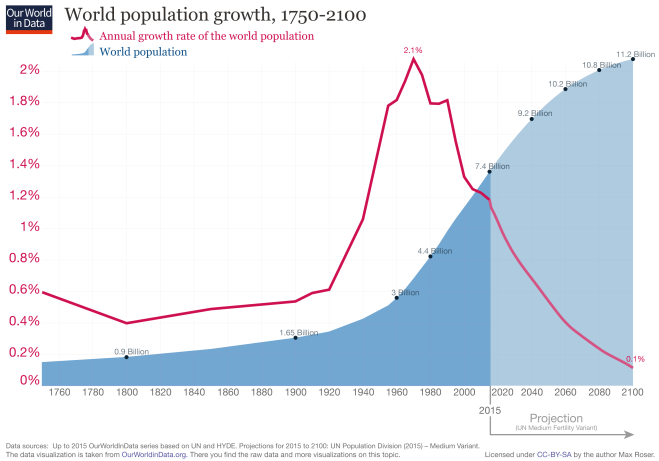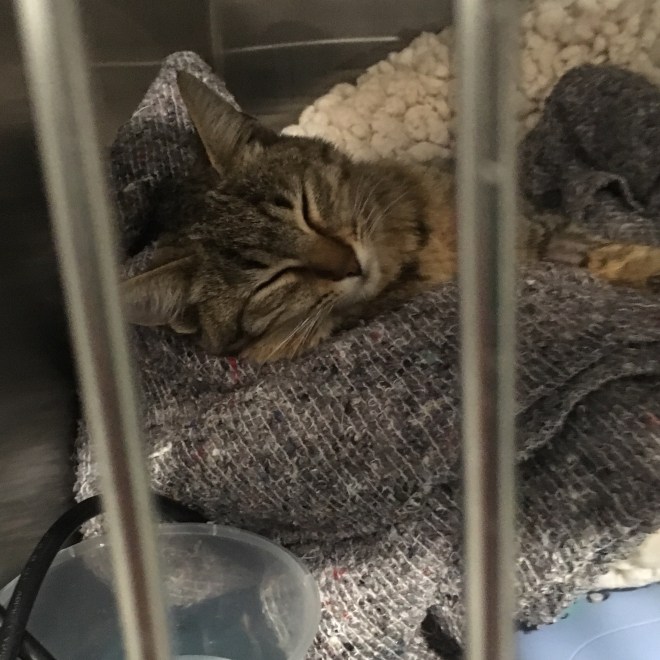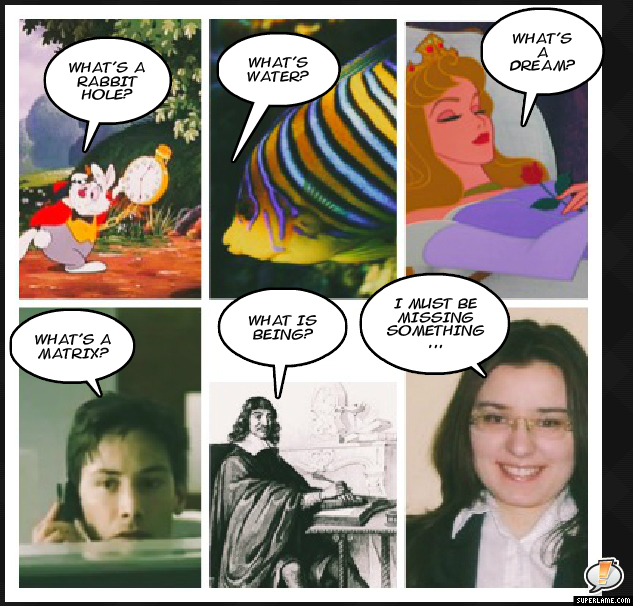The more things change, the more they stay the same. But this time it is really different:

What an uncomfortable graph. Sometimes when things scale, they are just a bigger version of the small thing. However, at times, they also develop new properties. A population of cells becomes an organ – and has new properties. A large teddy bear can be used as a pillow, while a small one cannot.
What can a large human population do that a small one couldn’t? What does it mean for the individual?
The above graph of world population vs time scares me because we’re going into the unknown. In a sense, each one of us is less important. It takes much more to compete. If you are “one in a thousand”, in 1800 that would have got you places. Today, not so much.
What does that mean for individuals? Can such a demand for food, water and energy be met, never mind sustainably? How do we find a place in such a competitive imminently expanding world? Albeit we’re no longer accelerating the growth, the sheer numbers are a little bit unnerving.

Not to fall into conspiracy theories or 1984/Brave New World despair, but for the sake of an analogy, consider cows, or minks, or any other farmed animal. I’ve always felt that breeding animals to kill them is a kind of (?necessary) evil, but it is somehow made better by the fact that they are bred. They don’t have to worry about food and get to have lots of babies. In a roundabout way, they have won in the Darwinian casino.
But then I wondered: if cows and minks are bred for their meat and their fur, are we kind of… bred for economic growth?
Each one of us has to comply with the assertion that success comes from having lots and lots of things in order for this to be perpetuated. Few people look for fame and fortune to exercise some kind of power (if you prefer “change the world”) – and to be fair I have respect for such people.

I get the sense though that to most people, fame and fortune is an end in itself. Furthermore, I suspect it is a product of our culture rather than just hedonism. For a proper first principles hedonist, it would never make sense to work so hard to have things they will never get time to enjoy.
I’ve always found it fascinating that the very people I know from school that were so rebellious that they just wouldn’t comply with the simplest of instruction become exemplars of compliance and obedience when there is a paycheck involved.
It’s someone’s birthday?
“I’ve work tomorrow.”
Can’t stand the sight of the boss?
“I have to go to work.”
Wife giving birth?
“I better get to work, so.”
It seems that no amount of personal problems can stand in the way of being at work. And when it does happen, the rest of the working tribe treats it as some kind of weakness and/or deceit to get out of doing work.
Buckminster Fuller comes to mind:
“We should do away with the absolutely specious notion that everybody has to earn a living. It is a fact today that one in ten thousand of us can make a technological breakthrough capable of supporting all the rest. The youth of today are absolutely right in recognizing this nonsense of earning a living. We keep inventing jobs because of this false idea that everybody has to be employed at some kind of drudgery because, according to Malthusian Darwinian theory he must justify his right to exist. So we have inspectors of inspectors and people making instruments for inspectors to inspect inspectors. The true business of people should be to go back to school and think about whatever it was they were thinking about before somebody came along and told them they had to earn a living.”
“Inspectors of inspectors”… The irony. A friend of mine, a former employee of a multinational once pointed out: we have trackers for trackers. Entire days are spent changing amber to green and red to amber.
Some also theorise that very few jobs require 9-5 x 5 days a week. A lot of time is spent being idle. Why then do the employers insist of you being there? I would argue it isn’t the employer: it’s the culture. Some people won’t take their job seriously if they are given the autonomy to manage their own time (though I always bet on the opposite when looking for people in my own ventures).
If you think about it, it’s kind of disrespectful to insist that someone is there just so that their boss has the option of coopting them into some work engagement. Another interesting (?side) effect is that predictably a person has no strength to create anything outside of work. An eight hour day of being surveyed and judged, a draining commute, an uncomfortable suit and a toilet seat you cannot sit on… As Taleb puts it:
“In short, every organization wants a certain number of people associated with it to be deprived of a certain share of their freedom. How do you own these people? First, by conditioning and psychological manipulation; second by tweaking them to have some skin in the game, forcing them to have something significant to lose if they were to disobey authority –something hard to do with gyrovague beggars who flouted they scorn of material possessions.”
I wonder if it is becoming harder, though, to be a gyrating roaming monk (these days they have a Mac and are called digital nomads) given that the population is growing. Is there room to be an individual? Nietzsche has his concerns:
“Those who commend work. – In the glorification of ‘work’, in the unwearied talk of the ‘blessing of work’, I see the same covert idea as in the praise of useful impersonal actions: that of fear of everything individual. Fundamentally, one now feels at the sight of work – one always means by work that hard industriousness from early till late – that such work is the best policeman, that it keeps everyone in bounds and can mightily hinder the development of reason, covetousness, desire for independence. For it uses up an extraordinary amount of nervous energy, which is thus denied to reflection, brooding, dreaming, worrying, loving, hating; it sets a small goal always in sight and guarantees easy and regular satisfactions. Thus a society in which there is continual hard work will have more security: and security is now worshipped as the supreme divinity. – And now! Horror! Precisely the ‘worker’ has become dangerous! The place is swarming with ‘dangerous individuals’! And behind them the danger of dangers – the individual!”
It’s pretty clear that Nietzsche’s talking about institutional employment.
This essay of mine isn’t about robbing the rich or some other way of getting out of work. It’s not promoting Zuckerberg’s universal basic income. It’s about the fact that work is indeed glorified. Much of what is called work is being trapped in purposelessness.

And it’s not even work that is glorified: nobody cares about the labour of a painter who hasn’t (yet) made their hobby into a job or a blogger, or whoever. It is the stamp of approval from some institution that people really respect. Perhaps, it is just easier to relate to.
I suppose, being Russian, I can’t help but be reminded of how easily institutions fail. Countless Russian firms have risen to unbelievable heights and quickly died in the last 20 years. Even the USSR itself: seeing such a behemoth collapse shatters one’s faith in institutions.
And it wasn’t even that weak, with real industry and gargantuan natural resources. In a completely different context, where I am now – Ireland – also has become a State and gone through a couple of different names in the XX century. That empire disappeared too.
Nietzsche above and Taleb (in multiple works) have spoken about this security that people look for. The security that people trade a portion of their freedom for. Clearly though, it is an illusion. Remember 2008?

Meanwhile, the seaside restaurant beside me boasts having been established in 1728. Chin chin, Mr Taleb, and chin chin to everyone being creative and working hard to not lose your individuality among the impending billions.


































